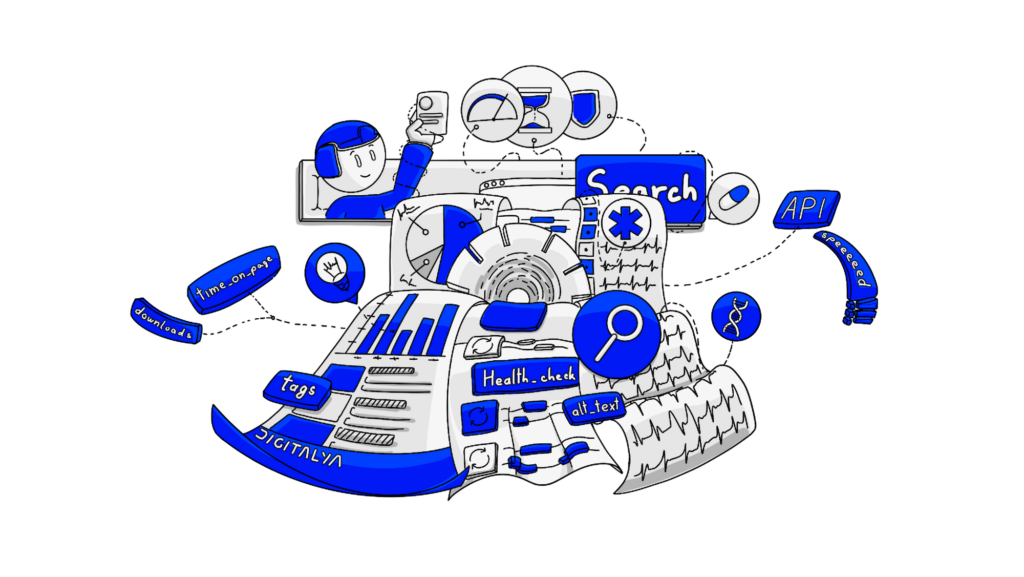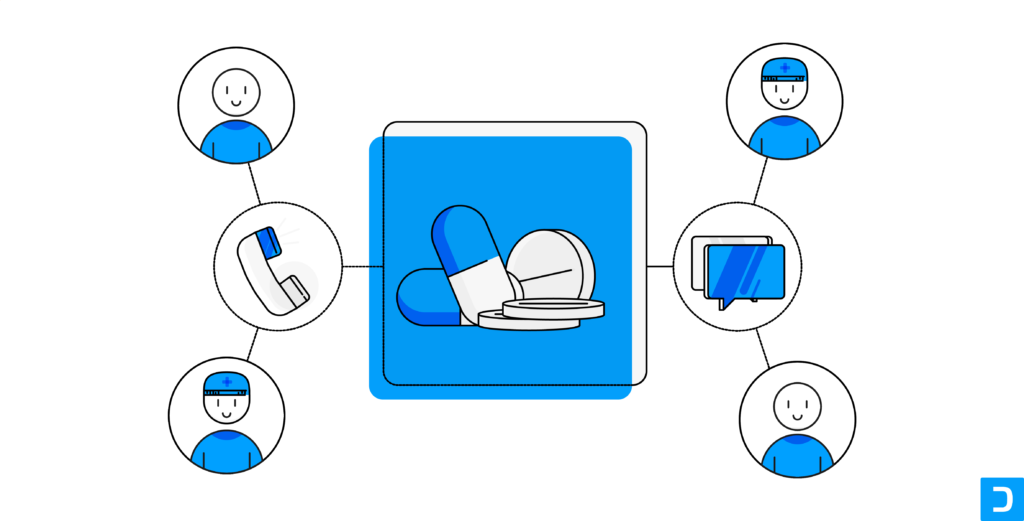Digital transformation has been a topic discussed by businesses for many years now, but only a few of them defined and implemented a digital transformation strategy. And with customers nowadays that are valuing personalized customer experiences and customizable products/services, businesses might succeed or fail only based on their ability to transform and evolve. In this extended case study we want to present to you a successful digital transformation example.
1. Digital transformation strategy
Though in 2018, 89% of organizations evaluated by IDG had plans to adopt a digital-first business strategy, only 44% have fully embraced this approach. And in 2020, according to PWC’s 2020 Digital IQ research, only 5% of the companies questioned are doing all it takes to get to payback from digital. And as a result, these digital leaders have 17% higher profit margin growth.
Given the new global events, driving digital transformation is a necessity more than ever. Companies that have been considering digitizing their processes for some years now changed their strategy and are researching ways to transition their services and products in the online medium fastly by following the key trends.
And as stated by Mika Ruokonen, business director at Futurice, in an interview for Information Age:
“Companies which stay human and customer-focused and manage to quickly innovate new digital businesses to solve problems created by the new conditions, are best placed to seize any nascent opportunities”.
With this in mind, we developed a comprehensive case study describing the digital transformation success of our partners at 2assistU. We worked together with them, Hidora, and Wizlynx, to help you fully understand the steps that a CEO, CTO, or CIO needs to take to digitally transform a business. We took into consideration all the phases that 2assistU went through in adopting a digital approach and developing a software product and compiled a step-by-step interview with their experience.
Just as a quick overview, by developing a digital solution and conducting other digital transformation initiatives, 2assistU managed to considerably grow its business performance. And as a result, they are day-by-day contributing to a simplified, faster, yet better auditing management in aviation, which constantly generates more powerful data analytics.

The transformational impact is the following:
- Thanks to teampulse (the software product that was developed), the time to plan and manage audits has been significantly reduced. We talk about 4.5 hours per audit, which means 130% time saved on admin work & repetitive tasks.
- Thanks to teampulse, which released 2assistU staff from administration work, they gained free time and resources to elaborate on new services and finally came up with five new services in favor of their clients.
- The services that they created were well received. They won new clients and were able to extend their team by three new people (project management & instructors).
In 2020, teampulse went international. The software is no longer solely used by companies in Switzerland, such as Zurich Airport or major logistics companies. It is now also used by providers at Vienna airport. And there are ongoing discussions about implementation at airports in Oman.
Let’s proceed further with their story of digital transformation.
2. Digital transformation example: Why did 2assistU decide to adopt a digital transformation strategy?
2assistU GmbH became a game-changer for the Swiss aviation industry by bringing to the market the first quality & training management and audit software for small and medium-sized aviation-related businesses. The software provided, since the beginning, a fully digital experience in managing quality and risk assessment.
With more than six modules, teampulse software helps SMEs to conduct from start to end the most critical processes like compliance, quality, training, and reporting management.
2assistU GmbH is a Swiss-based company specializing in auditing and training in Aviation Security (AVSEC), Crisis & Emergency Management and is certified by FOCA (The Federal Office of Civil Aviation). They help their clients to keep up with Quality and Safety/Security standards and train them to smoothly manage emergency and crisis situations.
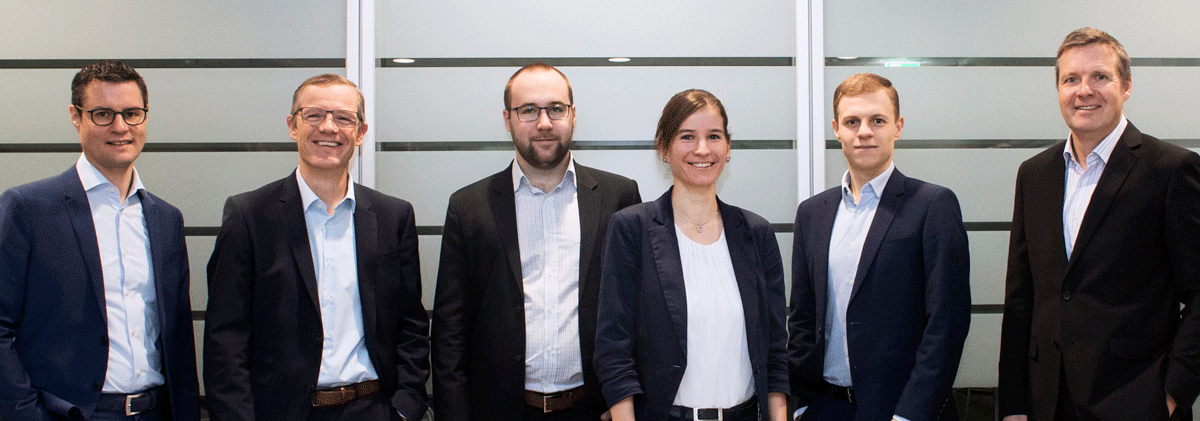
In order to achieve and keep up high quality, safety, and security standards, it was required for them to have clearly defined processes that are respected and regularly assessed and adjusted if necessary. For a long time, these processes were audited manually by using paper forms.
But, over the last years, the aviation industry has seen a growth in the number of audits carried out, which were mainly caused by increased quality and safety/security awareness. The fact that the regulatory requirements became stricter and more extensive had, as a consequence, a consistent and seamless need for monitoring these processes.
On the other hand, manual audits became more and more difficult since the regular updates on laws required a constant update of the documentation used for the audits. Also, the increased number of audits generated a vast amount of data to be analyzed – a task that would have resulted in a great effort and high staff costs when done manually.
As a result, developing a digital transformation strategy that would help them with process automation was imminent. And their objective of increased efficiency could only happen by developing a digital solution.
— Reto Gasser, Managing Partner at 2assistU”When talking about digital transformation initiatives, there are often concerns about job cuts. In our company, this was absolutely not the case. The digital innovation of our business processes allowed us to expand our services and to provide better customer experiences. There were no redundancies due to digitization. The opposite was the case, and a culture change happened: the entire organization enjoyed developing new services much more than the monotonous administration of quality audits when done manually.”
3. How to decide between Off-the-Shelf and Custom Software for a successful digital transformation?
“Before we decided to develop our own digital solution, we did profound software research to see if there was software on the market that could have solved our needs. The search for software was tied to certain specifications: for example, it had to be possible to host it in Switzerland. Data should not be stored abroad, not even backup data. Of course, we also wanted a software solution that would give us a unique selling point among our competitors. Software that we can adapt and extend flexibly at any time according to our needs and the needs of our customers.
I have to admit that creating our own digital solution was not the most cost-effective approach to solving the problem, but it was the most sustainable because the software belonged to us, and we didn’t have to depend on existing software vendors. And thanks to the fact that I have great experience in the creation of software, I was able to take over the project management, which saved us money and made the entire development easier.” — Roland Peer, Managing Partner at 2assistU
2assistU was looking for an easy-to-use, cost-effective application that combined all the advantages of digital transformation, such as fast querying of all data records, the paperless, centralized, and location-independent management of audits, training qualifications, and corrective actions, as well as the automated and easy analysis of data records.
Due to the fact that teampulse manages quality, safety, and security information, the product developed needed to be tailor-made, highly secure, and hosted on Swiss-based servers, as per aviation industry standards and requirements by the Swiss authorities and laws. Also, the code needed to pass an IT security audit to make sure that each feature respected the security measures.
“For us, it was important that the software was not simply mapping the manual processes 1:1, but that they are simplified and accelerated, and we do benefit from the digital advantages. We were fully open to changing our way of work, and we didn’t have any legacy system. This required that the development team understands the auditing process in order to provide alternative solutions or workflows.” — Reto Gasser, Managing Partner at 2assistU
So in 2014, 2assistU decided to look for an experienced software partner that would solve their challenges with a digital solution. That’s how Digitalya and 2assistU partnership started.
4. How to choose the right software development partner to digitally transform your business?
“Well, we had no clue how to start the digital transformation process and what is required to run our software. We had some ideas but did not know how they could be converted into digital and who would be the right partner to create the digital product. It is like when you plan to build your house, you have some ideas and visions about how the house should look, but you are missing an architect, and you do not know how to choose one and whom to trust.
I, therefore, did first market research using search engines and checked different software agencies from different countries. I expanded my research to the entire Europe, not only Switzerland, as I did not have any issues working with near-shore companies. I rather wanted to find talented software engineers with good technical skills and work with them remotely.
Consequently, I contacted multiple agencies and sent each a document with our requirements, asking them to provide us with one page describing their possible solution. We analyzed the documents and met three of them in person.

Digitalya convinced us because they have done other projects for other companies in the past, all about transforming manual business processes into software. In fact, the same digital transformation we wanted to see in our business. Consequently, the document they returned was totally focused on our needs.
When we met the Digitalya team for the first time, we had a workshop in which we, 2assistU, presented our current manual processes and how we would like to see them being transformed into software, and to what extent the software has to ease our work.
Even though the Digitalya team had no clue about quality management in aviation, they quickly understood our requirements. They made suggestions already during the workshop on how the digital transformation process could be done.
I also liked the fact that Ovidiu and Marius, the co-founders of Digitalya, were part of the workshop. Ovidiu understood our requirements from the business (user) perspective; he acted like a mentor between us, the users, and the software engineers, while Marius was in charge of choosing the right technologies.
Perhaps, it is comparable with a tailor-made dress: you know for which purpose you want to wear the dress, and you know the color it should have, but you expect the tailor to suggest the fabric, the patterns, the buttons, and the time required to tailor the dress, as well as the costs.
And why Romania? As mentioned, going near-shore was not really a matter of financials but finding skilled developers. And I liked the fact that the team in Romania spoke very good English. Also, Romanian is the Latin language, and the team was capable of communicating in other Latin languages, which eased the translation work while building our multilingual software covering German, English, French, and Italian. An advantage that other countries can barely provide, if at all. ” — Roland Peer, Managing Partner at 2assistU
5. Dedicated teams vs. freelancers – Which one to choose for digital innovation?
“I have experience with both, as I have done projects with freelance software engineers as well as with dedicated teams in the past. In general, both collaboration types work, all depending on the size of the project, the complexity, and the technical requirements.
I have worked with freelancers who were totally passionate about their work. They worked day and night and were available even on weekends. But this kind of cooperation became particularly tricky when the freelancer became ill, and the project stalled. Or, I recall certain features that required advanced technical skills and special knowledge; in such situations, it was important for the freelancer to have a business network to share and discuss technical challenges.
On the other hand, with a dedicated team, it is very unlikely that a project will get delayed due to an ill team member. During the development process of teampulse, one developer had to undergo surgery. His tasks were assigned to another team member; the project continued. But, we were all happy to have the same team member back after a while to benefit from his knowledge. Also, while working with a software company, you can benefit from an extensive knowledge base on multiple technologies.

For teampulse, we started with a dedicated team right from the very beginning. Why? Because building a successful Quality Management software requires vast expertise in quality management. My business partner, Reto, who has worked for many years in this area, has this vast expertise.
In order to build a state-of-the-art software, which is not only technically top but also corresponds to the latest standards and best practices in quality management, it was indispensable that the software engineers understood the business.
We wanted them to understand the quality management processes in-depth. We talk about hours of explanation on how it works, and such a knowledge transfer can only happen if the project has long-term planning.
Thanks to the knowledge transfer, the team was able to suggest technical solutions that matched the business requirements. This was crucial. At no point during the development cycle we had any doubts that a dedicated team was the wrong decision. The opposite was the case: we noticed that the team identified itself as teampulse team.” — Roland Peer, Managing Partner at 2assistU
6. What were the steps of the software development process from the client’s perspective?
“In the workshops, we created a document, a software brief, in which we described in detail the modules, functionalities, the decisions, as well as the timeline. I think the brief was of great help to anyone participating in the project. We, as customers, were assured that the software is built according to our needs. And the software engineers used the brief as guidance.
In the early stage, we had on-site workshops with the team every three months. The development itself happened (and still happens) in an agile approach; it is scrum-based with biweekly sprints. Also, we had weekly phone calls in which we discussed the current development stages and the most important topics and issues. Digitalya tracked all tasks in their project management software, which I was able to access at any time.
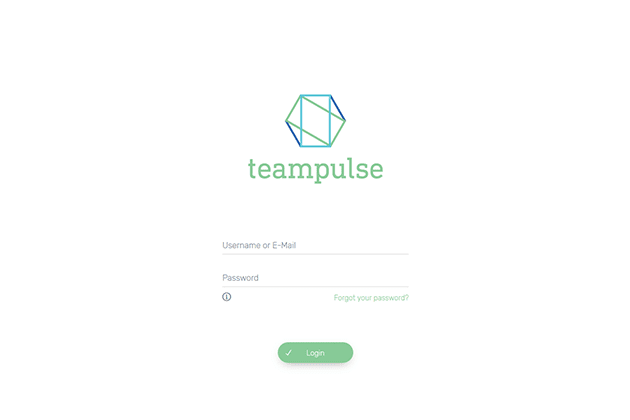
The development and overall cooperation went very smoothly. I liked the professional working environment. The time difference between Switzerland and Romania is only 1 hour, which is very convenient for team collaboration. Of course, there were some cultural differences. No, it was not the language; the entire team speaks very good English. But as with every new team, we had to get to know each other and find the best collaboration methods. This took about two-three weeks.” — Roland Peer, Managing Partner at 2assistU
7. Factors considered when choosing the web hosting provider
“For choosing a web hosting provider, I did again research for possible companies able to fulfill our requirements. First, we wanted to use Linode, which does not have a data center in Switzerland. I consequently researched a provider in Switzerland and found Hidora. They were the first provider in Switzerland that offered scalable Paa Services based on Jelastic.
For comparison, the biggest hosting provider in Switzerland only launched the same offer, a Managed Flex Server, in June 2019. At Hidora, we have used this service since 2016.
I also liked the fact that we only pay for the resources our software actually uses. This helped us a lot to keep the hosting costs low. And thanks to auto-scaling, our application can grow at any time without changing the environment. Hidora has seen respectful growth in its customer base over the last few years, but it managed to provide continuous professional and very personal service.
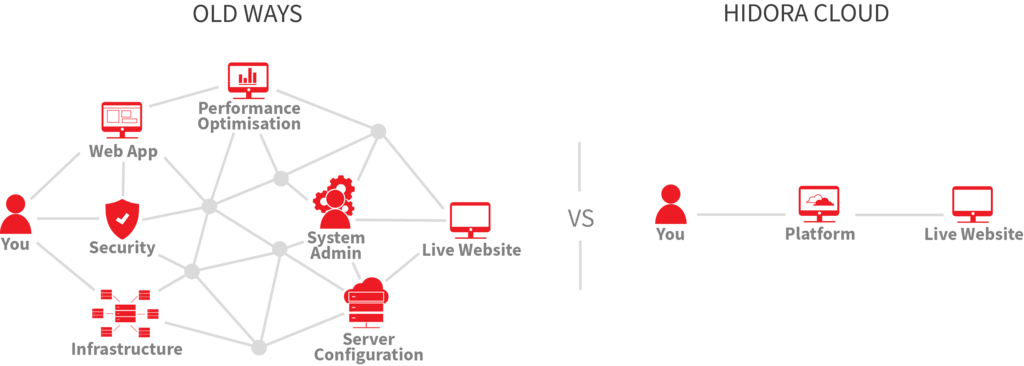
When using teampulse, clients can be assured that the data hosted in Switzerland will never leave the country. This also applies to data backups. Hidora gave us the promise that the data is only hosted in Switzerland.” — Roland Peer, Managing Partner at 2assistU
“At Digitalya, we have collaborated with the Hidora team since 2016 and have three digital products hosted on their servers. We plan to extend it even further. Their infrastructure solutions are the best fit for our tailor-made digital products deployed in Switzerland. What we value the most with their solution model is the scalability, the easy setup, and the great support.” — Ovidiu Cojocariu, CEO at Digitalya
8.Why Code Audits are essential for every software project?
Just so you fully understand the benefits of performing a code security audit Christian Fichera, Cyber Security Director at Wizlynx gave us a short testimonial about why every product owner should conduct one. “Nowadays, I cannot think of anybody who is not concerned by security. Everybody who has a system, computer, server, network, mobile or web application, or any device containing or handling data should perform a security audit. So basically everybody. The problem is awareness. Most people think they are secure enough or that their data cannot be interesting for hackers. Our experience proves them wrong: anybody can be a target, regardless of the type or size of the business.”
For 2assistU, performing a code security audit was mandatory due to the fact that teampulse manages quality, safety, and security aviation audits. The application needed to fulfill the aviation industry standards and requirements imposed by the Swiss authorities and laws.
“Besides secure and reliable data hosting, it was also important that the teampulse application is considered secure. This is why we hired Wizlynx, a Swiss-based company specializing in IT security, to inspect our software. The so-called “IT security audit” was performed by Wizlynx the previous year June for the second time in a row.
Wizlynx is a reputable Swiss company with a vast experience in cyber security. 2AssistU and WizLynx collaboration dates back many years. They simply have proven their professionalism while working with us. Their audit report was very detailed and helpful and contained a lot of recommendations to make the entire software even more secure.” — Roland Peer, Managing partner at 2assistU
For the Digitalya team, having for the first time our code audited was a challenge. We learned many things and implemented new security processes due to it, which we now adopt in every project. Also, receiving the result that teampulse successfully passed the audit brought us a lot of happiness.
9. From in-house software to SaaS – what was the process?
“Well, we initially developed Quality Management software for internal purposes. Over the course of development, we noticed that many of our clients, to whom we provided safety and security consulting, do not have a digital solution for their own quality management process either. To manually measure the quality and performance was difficult and involved a lot of paperwork. Plus, the results from audits weren’t immediately available to the management team as results had to be analyzed manually, and statistics were created manually – a time-consuming and staff-intense task.
We, therefore, developed the software further, based on customer feedback, to make it available for our clients. There are even features that are explicitly done on customer request: Training Management (to manage training requirements and qualifications of the entire workforce) or Read & Sign Management (to electronically sign-as-read documents and important communication) are two features which were developed on client’s behalf and are now available to all teampulse clients. Here gathering customer insight was highly valuable.
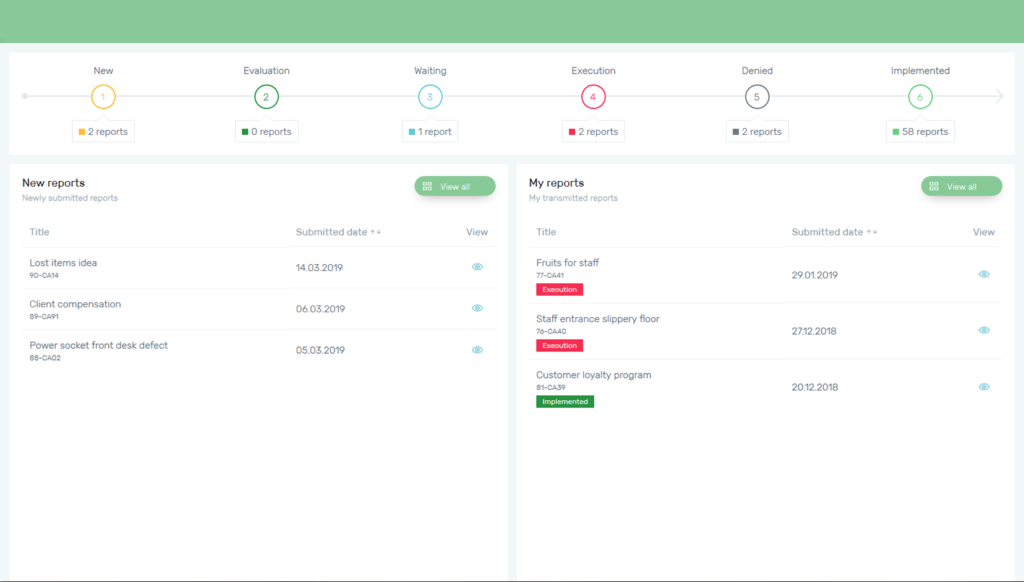
Nowadays, we see a tendency for even the authorities to prefer digital Quality Management. Again, the software makes collaboration and data exchange much easier.” — Roland Peer, Managing Partner at 2assistU
10. How Digitalya grew after working on an aviation quality management software
Developing a software product for the aviation industry came with its fair share of different challenges. Some of them were on a technical level, and others were on a business level.
It was essential for the entire development team to understand how the application would be used in order to help 2assistU have a successful digital transformation. By understanding the business needs, we could come up with different approaches during the implementation, and at the same time, we could help in building an intuitive and easy-to-use product.
From a technical point of view, we have encountered many challenges, such as: we had to build an application that is used for dynamically creating company subdomains that run the application independently and at the same time, keeping the highest level of data security and quality possible.
Keeping a very high level of data security was something new for us in 2014, and it was a learning experience for the entire team. To achieve this, we had to respect a list of different requirements provided by the IT Security team. Some of them were requirements that helped us, in the long run, to grow our skills and experience.

Periodically, a security audit is performed for the application to make sure that the platform meets the Swiss Aviation Security Standards. If the first security audit was one of the most stressful periods for the entire team, now we have fully embraced it, and we impatiently wait to see what is new in this area and how we can further improve the product.
Working on the teampulse platform made us, as an organization, raise our game and invest time in new processes that lead to higher product quality. As a result, we implement what we have learned in every project we work on since then.
As Bogdan Padurariu, our delivery manager, says:
We are preparing every product that we develop to pass a Swiss Aviation Security IT Audit at any moment.
11. Conclusion
“Thanks to teampulse, the data collected through the audits is stored consistently in one place. This enables us to process the data further, analyze it, compare and share, recognize key trends, and to early identify possible issues. Thanks to the fact that the data is centrally stored and statistics are created on the fly, our clients have any time a clear picture of the company’s quality and security performance. Statistics that would take days to be generated if done manually.
We are happy and grateful at the same time that we decided to partner up with Digitalya in the development process of teampulse.” — Roland Peer, Managing Partner at 2assistU
The process of business innovation is never easy, and we hope that this guide will help you in defining a clear set of steps. If you want to discuss more about it and build a digital transformation strategy for your company, you can send us a message, and we will happily assist you. You can read more about the Product Strategy Workshop and contact us.
Also, in the article How much does it cost to make an app you can read more about the development costs of building a digital solution and the costs of integrating technologies like artificial intelligence (AI) with machine learning (ML), augmented reality (AR) or virtual reality (VR), Internet of Things (IoT) technologies and Robot Process Automation (RPA).






